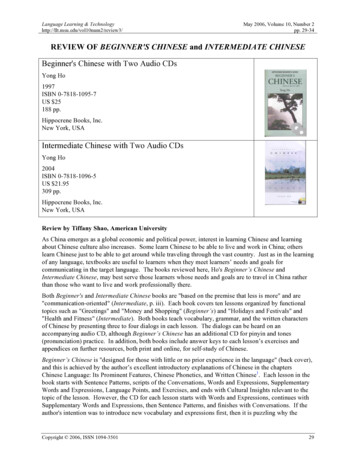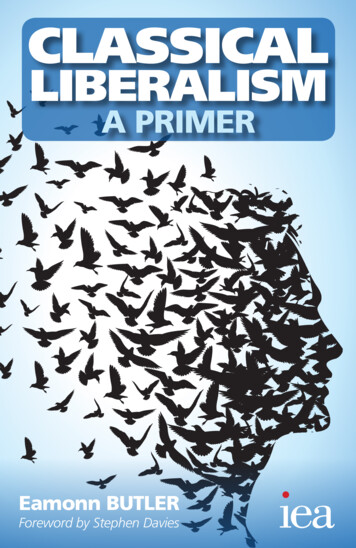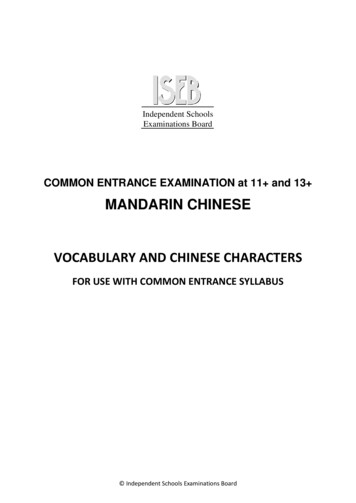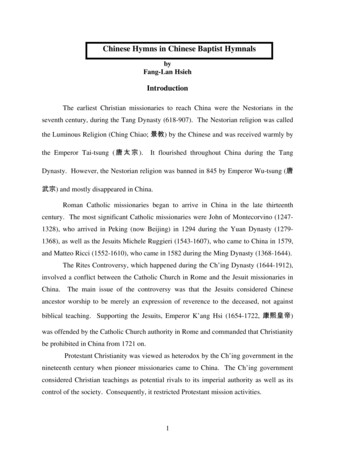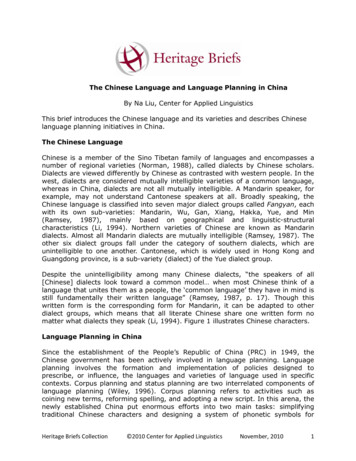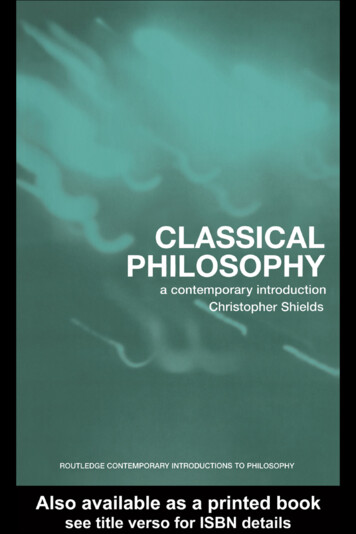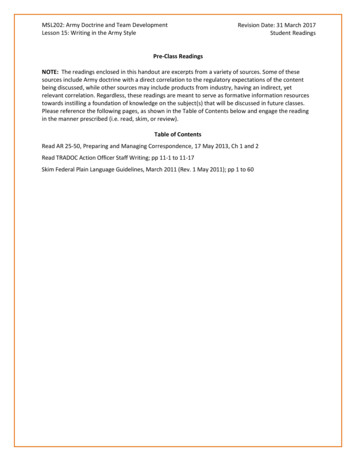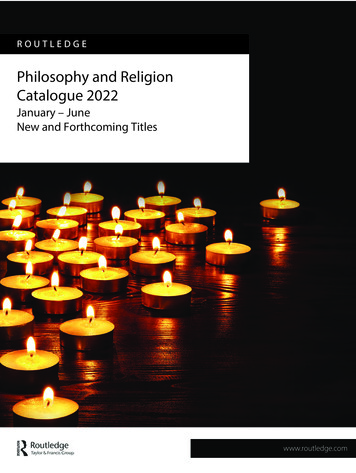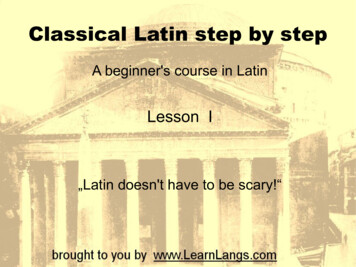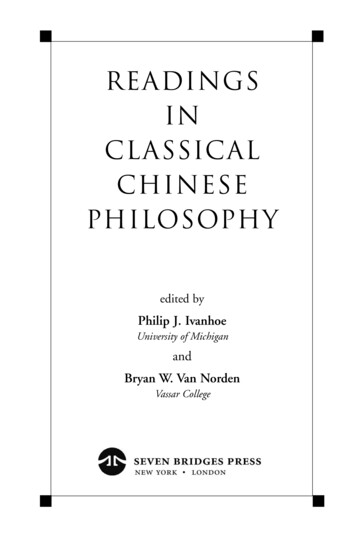
Transcription
ReadingsInClassicalChinesePhilosophyedited byPhilip J. IvanhoeUniversity of MichiganandBryan W. Van NordenVassar College
Read the “Introduction” and the highlighted passages. Feel free to read other sectionsas well.Reading The Analects can be a little disorienting at first because of the aphoristic andseemingly fragmentary style in which it was written. Nonetheless, coherent underlyingthemes and philosophical ideas are present. As you read, think about what these largerthemes and positions might be and how different passages connect with one another.Guiding Questions:1. What is Kongzi saying about some of his major concepts including ren(humaneness), li (ritual propriety), zhong (loyalty), shu (empathy or sympatheticunderstanding), xiao (filial piety), and wuwei (effortless action or nonaction)?2. What is the overall picture of ethics that Kongzi is trying to convey? How doesKongzi think we should live our lives?3. What are Kongzi’s thoughts on government, ruling, and how society should bestructured?4. Do you agree with Kongzi’s views? Why or why not?5. Do you think Confucianism is a form of virtue ethics? Why or why not?Seven Bridges Press135 Fifth AvenueNew York, NY 10010-7101Copyright 2001 by Seven Bridges Press, LLCAll rights reserved. No part of this book may be reproduced, stored in a retrieval system, ortransmitted in any form or by any means, electronic, mechanical, photocopying, recording,or otherwise, without prior permission of the publisher.Publisher: Ted BolenManaging Editor: Katharine MillerComposition: Rachel HegartyCover design: Stefan Killen DesignPrinting and Binding: Victor Graphics, Inc.LIBRARY OF CONGRESS CATALOGING-IN-PUBLICATION DATAReadings in classical Chinese philosophy / edited by Philip J. Ivanhoe,Bryan W. Van Norden.p. cm.ISBN 1-889119-09-11. Philosophy, Chinese--To 221 B.C. I. Ivanhoe, P. J. II. VanNorden, Bryan W. (Bryan William)B126 .R43 2000181'.11--dc21Manufactured in the United States of America10 9 8 7 6 5 4 3 2 100-010826
CHAPTER ONEKongzi (Confucius)“The Analects”IntroductionThe Analects (Lunyu )*—literally, the “Classified Teachings”) purportsto be a record of the teachings of Kongzi ! or “Confucius” (551–479B.C.E.) and his disciples.1 Kongzi believed that the Golden Age of humankind had been realized during the height of Zhou dynasty, fromc. 1045–771 B.C.E. (the so-called Western Zhou period). Personified by thecultural heroes King Wen (d.c. 1050 B.C.E.), his son King Wu (r. 1045–1043) and the virtuous regent, the Duke of Zhou (r. c. 1043–1036 B.C.E.),the early Zhou rulers established and maintained a special relationship withtian , “Heaven,” by properly and sincerely observing a set of sacred practices collectively referred to as the li ,, “rites” or “rituals.” The scope of therites was quite vast, including everything from grand state ceremonies tothe proper way to sit or fasten one’s lapel—details that we might think ofas issues of etiquette. In return for such formal obedience to Heaven in allmatters great and small, the Zhou royal line was rewarded with a ming %,1Some scholars have questioned the traditional view of the text as a unified work, arguing that it represents many different chronological strata and even incompatible viewpoints.The Chinese have nevertheless read it as a coherent whole for thousands of years, and thisis the perspective on the text that we adopt here. This said, the reader will note that our selection gives greater weight to those portions of the text generally agreed to be earlier andmost authoritative, Books 1–9.
2 kongzi (confucius)“Mandate,”2 to rule China, manifested in the form of a charismatic de -,“Virtue,” or power.By Kongzi’s age, the Zhou kings had been reduced to mere figureheads,and real political power was in the hands of various local rulers. In Kongzi’seyes, the “scholars” of his day—those who should properly be motivated bya love for learning and a devotion to the culture of the Zhou—were interested only in self-aggrandizement and sensuous pleasures, and the people,thereby bereft of moral leadership and grown unruly, could only be controlled through strict laws and harsh punishments. Despite the bleakness ofthis world, Kongzi believed that there was still hope for humanity, becausethe traditional Zhou ritual forms and written classics—which had beencarefully preserved by a small group of cultural specialists, the ru ., “Erudites,”3—could serve as a sort of blueprint for rebuilding the lost GoldenAge. Kongzi thus dedicated his life to both transmitting these culturalforms to his contemporaries and striving to embody them in his own person, hoping in this way to lead his fallen world back to the dao /, “Way,”of Heaven.Involving lifelong and sincere devotion to traditional cultural forms,Kongzi’s Way is to culminate eventually in a kind of intuitive mastery ofthose forms, and one who has attained this state of consummate mastery—the junzi 0!, “gentleman”—is said to possess the supreme virtue of ren 1,“true humaneness” or “humanity.” Originally referring to the strong andhandsome appearance of a noble warrior, ren designates for Kongzi the quality of the perfectly realized person—one who has so completely masteredthe Way that it has become a sort of second nature. Such a state of spiritualperfection is referred to as wuwei 23, “effortless action” or “nonaction”: astate of spontaneous harmony between individual inclinations and the sacred Way of Heaven. Through the power of Virtue accruing to one so perfectly in harmony with Heaven, this state of individual perfection is to leadto the spontaneous and effortless ordering of the entire world. There will beno need for raising armies, instituting laws, or issuing governmental decrees,for the entire world will be as inexorably drawn to a ruler with true Virtueas the heavenly bodies are bound to their proper circuits in the sky.2By the time of the Analects, the term ming had taken on the additional meaning of“fate” or “destiny,” but was thought to be similarly decreed by Heaven. For a discussion ofthis term, see Edward (Ted) Slingerland, “The Conception of Ming in Early ChineseThought,” Philosophy East & West 46.4 (1996), pp. 567–81.3SeeImportant Terms and Analects 6.13 for Kongzi’s criticism of the “petty ru.”
The analects 3Book One1.1 The Master said, “To study, and then in a timely fashion to practicewhat you have learned—is this not satisfying? To have companions arrivefrom afar—is this not a joy? To remain unrecognized by others and yet remain free of resentment—is this not the mark of the gentleman?”1.2 Youzi4 said, “It is unlikely that one who has grown up as a filial son andrespectful younger brother will then be inclined to defy his superiors, andthere has never been a case of one who is disinclined to defy his superiorsstirring up a rebellion.“The gentleman applies himself to the roots. Once the roots are firmlyplanted, the Way will grow therefrom. Might we thus say that filiality andbrotherly respect represent the root of ren?”1.3 The Master said, “A glib tongue and an ingratiating manner are rarelysigns of ren.”51.6 The Master said, “A student should be filial toward his parents when athome and respectful toward his elders when abroad. Careful in action andtruthful in speech, he should display an expansive care for the multitude andseek to draw near to those who are ren. If in the course of his duties he findshimself with energy to spare, he should devote it to study of the wen 4,‘cultural arts.’”1.9 Zengzi6 said, “Be meticulous in observing the passing of those close toyou and do not fail to continue the sacrifices to your distant ancestors. Thiswill be enough to cause the Virtue of the people to return to fullness.”1.10 Ziqin said to Zigong,7 “When our Master arrives in a state, he invariably finds out about its government. Does he actively seek out this information? Surely it is not simply offered to him!”4Adisciple of Kongzi.5A suspicion of those who are overly glib or outwardly pleasing is a common theme in theAnalects. In Analects 15.11, the danger presented by ningren 5é, “glib people,” is comparedto the derangement of morals brought about by the decadent music of the state of Zheng.6Adisciple of Kongzi.7Bothdisciples of Kongzi.
4 kongzi (confucius)Zigong answered, “Our Master acquires it through being cordial, good,respectful, frugal, and deferential. The Master’s way of seeking it is ratherdifferent from other people’s way of seeking it, is it not?”81.12 Youzi said, “In the application of ritual, it is harmonious ease9 that isto be valued. It is precisely such harmony that makes the Way of the Former Kings so beautiful. If you merely stick rigidly to ritual in all matters,great and small, there will remain that which you cannot accomplish. Yet ifyou know enough to value harmonious ease but try to attain it withoutbeing regulated by the rites, this will not work either.”1.15 Zigong said, “Poor and yet not obsequious, rich and yet not arrogant—what would you say about someone like that?”The Master answered, “That is acceptable, but it is not as good as beingpoor and yet full of joy, rich and yet fond of ritual.”Zigong said, “In the Odes we read,As if cut, as if polished;As if carved, as if ground.10Is this not what you have in mind?”11The Master said, “Zigong, you are precisely the kind of person withwhom one can begin to discuss the Odes. Informed as to what has gone before, you know what is to come.”Book Two2.1 The Master said, “One who rules through the power of Virtue mightbe compared to the Pole Star, which simply remains in its place while receiving the homage of the myriad lesser stars.”8That is, Kongzi does not actively pry or seek out information, but rather is so perfectedin Virtue that what he seeks comes to him unbidden, in a wuwei fashion.9Thatis, a state of he 7, “harmony,” between inner emotions and outward form.10Mao# 55.11That is, a person whose character has been arduously shaped and perfectly transformedin such a manner.
The analects 52.2 The Master said, “The three hundred poems in the Odes can be judgedwith a single phrase: ‘Oh, they will not lead you astray.’”122.3 The Master said, “If you try to lead the common people with governmental regulations and keep them in line with punishments, the laws willsimply be evaded and the people will have no sense of shame. If, however,you guide them with Virtue, and keep them in line by means of ritual, thepeople will have a sense of shame and will moreover reform themselves.”2.4 The Master said, “At age fifteen I set my heart upon learning; at thirty Itook my stand;13 at forty I became free of doubts;14 at fifty I understood theHeavenly Mandate;15 at sixty my ear was attuned;16 and at seventy I couldfollow my heart’s desire without overstepping the bounds of propriety.”2.7 Ziyou17 asked about filial piety. The Master said, “Nowadays, ‘filial’ isused to refer to anyone who is merely able to provide their parents withnourishment. But even dogs and horses are provided with nourishment. Ifyou do not treat your parents with reverence, wherein lies the difference?”2.9 The Master said, “I can talk all day long with Yan Hui18 without himonce disagreeing with me or asking questions. In this way, he seems a bitdim-witted. And yet when he retires from my presence and I observe hisbehavior in private, I see that it is in fact worthy to serve as an illustrationof what I have taught. Hui is not so stupid after all.”12Mao # 297. The original reference is to powerful war horses bred to pull chariots, whoare trained not to swerve from the desired path. The metaphorical meaning is that one committed through study to the Odes—“yoked” to them, as it were—will not be led astray.13Thatis, through mastery of the rites; cf. Analects 8.8, 16.13, and 20.3.14Cf.Analects 9.29.15Cf.Analects 16.8, 20.3.16Someinterpretations take this to mean that Kongzi at this point immediately apprehends the teachings he hears, others that there is no conflict between his inner dispositionsand the teachings of the sages. The latter seems more plausible, as it more clearly links thisstage with the stage that follows.17Adisciple of Kongzi.18Kongzi’sfavorite disciple, who tragically died at an early age (see Analects 5.9, 6.3, 6.7,6.11, and 11.9).
6 kongzi (confucius)2.10 The Master said, “Pay attention to the means a man employs, observethe path he follows, and discover where it is he feels at home.19 How canhis character remain hidden? How can his character remain hidden?”2.11 The Master said, “A true teacher is one who, keeping the past alive, isalso able to understand the present.”2.12 The Master said, “The gentleman does not serve as a vessel.”202.15 The Master said, “To learn without si 8, ‘thinking,’ will lead to confusion. To think without learning, however, will lead to fruitless exhaustion.”212.21 Someone asked Kongzi, “Why is it that you are not participating ingovernment?”22The Master answered, “We read in the History:Filial, oh so filial as a son, a friend to one’s brothers,both younger and elder; [in this way] exerting aninfluence upon the government.23Thus, in being a filial son and good brother one is already taking part ingovernment.24 What need is there, then, to speak of ‘participating ingovernment’?”2519Cf.Analects 4.2.20Qi 9, literally a ritual vessel or implement designed to serve a particular function, isalso used by extension to refer to officials who are specialized in one particular task. Thegentleman is not a narrow specialist (cf. Analects 5.4, 6.13, 9.2, 9.6, 13.4 and 19.7).21Cf.Analects 15.31.zheng 3: (literally, “doing government”). The reference is to Kongzi’s lack of anofficial position.22Wei23Cf. James Legge, trans., The Chinese Classics, Volume III, The Shoo King, reprint (HongKong: Hong Kong University Press, 1970), p. 535.24Cf.Analects 1.2.25The point is that one should be “doing government” through wuwei 23, “notdoing,”: that is, by perfecting oneself—as Youzi puts it in Analects 1.2, establishing the“root” of virtue—and letting the rest follow naturally.
The analects 7Book Three3.1 Kongzi said of the head of the Ji clan, “He uses eight rows of dancersin his courtyard.26 If this man can be tolerated, who cannot be tolerated?”3.3 The Master said, “A man who is not ren—what has he to do with ritual? A man who is not ren—what has he to do with music?”273.4 Lin Fang28 asked about the roots of ritual practice.The Master exclaimed, “Noble indeed are you to ask such a question!When it comes to ritual, it is better to be frugal than extravagant. When itcomes to mourning, it is better to be overwhelmed with grief than overlycomposed.”3.8 Zixia29 asked, “[The Odes say,]Her artful smile, with its alluring dimples,Her beautiful eyes, so clear,The unadorned upon which to paint.30What does this mean?”The Master said, “The task of applying colors comes only after a suitable unadorned background is present.”Zixia said, “So it is the rites that come after?”31The Master said, “Zixia, you are truly one who can anticipate my thoughts!It is only with someone like you that I can begin to discuss the Odes.”26Later ritual texts describe this as a ritual prerogative of the emperor; presumably inKongzi’s time it was viewed as a prerogative of the Zhou kings.27This comment is probably also directed at the head of the Ji clan criticized in Analects3.1. Cf. Analects 3.12 and 17.11.28Lin Fang is usually identified as a man of Lu, and presumably shares Kongzi’s concernthat his fellow citizens were neglecting the “roots” and attending to the superficial“branches” of ritual practice.29Adisciple of Kongzi.30Thefirst two lines appear in the present version of Odes (Mao # 57), while the thirddoes not.31That is, the adornment provided by the rites is meant to build upon appropriate native emotions or tendencies. Just as all of the cosmetics in the world are of no avail if thebasic lines of the face are not pleasing, so is the refinement provided by ritual practice of nohelp to one lacking in zhi “native substance.” Cf. Analects 3.4, 5.10 and 6.18.
8 kongzi (confucius)3.11 Someone asked for an explanation of the di ; sacrifice.32 The Master said, “I do not fully comprehend it. One who truly understood it couldhandle the world as if he had it right here,” and he pointed to the palm ofhis hand.3.12 “Sacrifice as if [they were] present” means that, when sacrificing to thespirits, you should comport yourself as if the spirits were present.33The Master said, “If I am not fully present at the sacrifice,34 it is as if Idid not sacrifice at all.”3.14 The Master said, “From the vantage point of the Zhou, one’s gaze canencompass the two dynasties that preceded it.35 How brilliant in culture itwas! I follow the Zhou.”3.17 Zigong wanted to do away with the practice of sacrificing a lamb toannounce the new moon.36The Master said, “Zigong! You regret the loss of the lamb, whereas I regret the loss of the rite.”373.18 The Master said, “If in serving your ruler you are careful to observeevery detail of ritual propriety, others will [wrongly] think you obsequious.”3832An important sacrifice to the earliest known ancestor of the reigning dynasty, the performance of which was the prerogative of the presiding ruler. By Kongzi’s time, the performance of this ceremony had degenerated to a point that he could no longer bear to look upon it.33That is, with an attitude of reverence and awe. There is no attribution for this line, andits form (cryptic text followed by an expanded, explanatory version) suggests that it mightbe a fragment from a lost ritual text interpolated by a later editor. Whether the Master’swords or not, it nonetheless clearly harmonizes with the comment from Kongzi that follows.34Although some commentators take “not being present” in the literal sense (i.e., notbeing physically present at the sacrifice, and sending a proxy in one’s stead), the precedingcomment would suggest that what is at issue is psychological or spiritual presence.35Thatis, the Xia and Shang dynasties.36Apparentlythis sacrifice had originally been part of a larger ritual to welcome the newmoon. By Kongzi’s time the ritual itself had fallen into disuse in Lu, whereas the sacrifice—being the responsibility of a particular government office—had survived. Zigong does notsee the point of continuing this vestigial, materially wasteful practice in the absence of itsoriginal ritual context.37Continuing this vestigial practice is Kongzi’s way of mourning the loss of the originalrite and keeping its memory alive, which in his view is worth the cost of an occasional lamb.38Ritualpractice had so degenerated by Kongzi’s age that a proper ritual practitioner wasviewed with suspicion or disdain.
The analects 93.20 The Master said, “The ‘Cry of the Osprey’39 expresses joy withoutbecoming licentious, and expresses sorrow without falling into excessivepathos.”3.23 The Master was discussing music with the Grand Music Master of Lu.He said, “What can be known about music is this: when it first begins, itresounds with a confusing variety of notes, but as it unfolds, these notes arereconciled by means of harmony, brought into tension by means of counterpoint, and finally woven together into a seamless whole. It is in this waythat music reaches its perfection.”403.24 A border official of Yi requested an audience with the Master, saying,“I have never neglected to obtain an audience with the gentlemen who havepassed this way.” Kongzi’s followers thus presented him.After emerging from the audience, the border official remarked to thegathered disciples, “You disciples, why should you be concerned about yourMaster’s loss of office?41 It has been too long that the world has been without the Way, and Heaven intends to use your Master like the wooden clapper in a bell.”42Book Four4.1 The Master said, “With regard to neighborhoods, it is the presence ofthose who are ren that makes them desirable. Given a choice, then, howcould someone who does not choose to dwell in ren be considered wise?”4.2 The Master said, “Those who are not ren cannot remain constant in adversity and cannot enjoy enduring happiness. Those who are ren find their39Thefirst of the Odes, and sometimes used to refer to the Odes as a whole.40Musicthus serves as a model or metaphor for the process of self-cultivation: startingin confusion, passing through many phases and culminating in a state of wuwei perfection.41Thisloss of office is presumably the reason that Kongzi and his disciples are leavingthe state.42That is, to wake up the fallen world. Some commentators believe that the bell referredto is the kind used by itinerant collectors and transmitters of folk songs, and that the border official’s point is thus that Heaven has deliberately caused Kongzi to lose his official position so that he might wander throughout the realm, spreading the teachings of the Way.
10 kongzi (confucius)repose in ren; those who are wise follow ren because they know that theywill li , ‘profit,’ from it.”4.4 The Master said, “Having merely set your heart sincerely upon ren, youcan be sure of remaining free of odium.”4.5 The Master said, “Wealth and honor are things that all people desire,and yet unless they are acquired in the proper way I will not abide them.Poverty and disgrace are things that all people hate, and yet unless they areavoided in the proper way I will not despise them.“If the gentleman abandons ren, how can he be worthy of that name? Thegentleman does not violate ren even for the amount of time required to eat ameal. Even in times of urgency or distress, he does not depart from it.”4.6 The Master said, “I have yet to meet a person who truly loved ren orhated a lack of ren. One who loved ren could not be surpassed, while one whohated a lack of ren would at least be able to act in a ren fashion, insofar as hewould not tolerate that which is not ren being associated with his person.“Is there a person who can, for the space of a single day, simply devotehis efforts to ren? I have never seen one whose strength is insufficient forthis task. Perhaps such a person exists, but I have yet to meet him.”434.7 The Master said, “People are true to type with regard to that which theyoverlook. Observe closely what a person overlooks—then you will knowwhether or not he is ren.”444.8 The Master said, “Having in the morning learned the Way, one coulddie that evening without regret.”4.9 The Master said, “A true shi , ‘scholar,’ is one who has set his heartupon the Way. A fellow who is ashamed merely of shabby clothing or meager rations is not even worth conversing with.”4.10 The Master said, “Acting in the world, the gentleman has no predispositions for or against anything. He merely seeks to be on the side of whatis yi ?, ‘right.’”43Cf.Analects 7.30.44That is, it is often in unpremeditated, unconscious actions that one’s true character isrevealed.
The analects 114.12 The Master said, “If your conduct is determined solely by considerations of profit you will arouse great resentment.”4.13 The Master said, “If a person is able to govern the state by means ofritual propriety and deference, what difficulties will he encounter? If, onthe other hand, a person is not able to govern the state through ritual propriety and deference, of what use are the rites to him?”454.14 The Master said, “Do not be concerned that you lack an official position, but rather concern yourself with the means by which you might takeyour stand. Do not be concerned that no one has heard of you, but ratherstrive to become a person worthy of being known.”4.15 The Master said, “Zengzi! All that I teach46 is unified by one guidingprinciple.”Zengzi answered, “Yes.”After the Master left, the other disciples asked, “What did he mean bythat?”Zengzi said, “All of what the Master teaches amounts to nothing morethan zhong @, ‘loyalty,’ tempered by shu A, ‘sympathetic understanding.’”474.16 The Master said, “The gentleman understands what is right, whereasthe petty man understands profit.”4.17 The Master said, “When you see someone who is xian B, ‘worthy,’concentrate upon becoming their equal; when you see someone who is unworthy, use this as an opportunity to look within yourself.”45Cf.Analects 13.5.46The word rendered here as “teach” (dao /) also means “the Way,” and a double entendre is almost certainly intended: “all that I teach” is also “my Way.”47Tobe zhong “loyal” or “dutiful” involves fulfilling the duties and obligations proper toone’s ritually defined role (see Analects 5.19 below for a description of someone deemedzhong by Kongzi). This virtue is to be tempered by the virtue of shu “sympathetic understanding”: the ability, by means of imaginatively putting oneself in the place of another, toknow when it is appropriate or yi, “right,” to bend or suspend the dictates of role-specificduty. Cf. Analects 5.12, 6.30, 12.2 and 15.24.
12kongzi (confucius) 4.18 The Master said, “In serving your parents you may gently remonstratewith them. However, once it becomes apparent that they have not takenyour criticism to heart you should be respectful and not oppose them, andfollow their lead diligently without resentment.”4.19 The Master said, “When your parents are alive, you should not travelfar, and when you do travel you must keep to a fixed itinerary.”484.20 The Master said, “One who makes no changes to the ways of his fatherfor three years49 after his father has passed away may be called a filial son.”4.21 The Master said, “You must always be aware of your parents’ age. Onthe one hand, it is a cause for rejoicing, on the other, a source of anxiety.”504.22 The Master said, “People in ancient times did not speak lightly, andwere ashamed lest their actions not measure up to their words.”514.23 The Master said, “Very few go astray who comport themselves withrestraint.”4.24 The Master said, “The gentleman wishes to be slow of speech and cautious with regard to his actions.”4.25 The Master said, “Virtue is never alone; it always has neighbors.”52Book Five5.1 The Master said of Gong Yechang, “He is marriageable. Although hewas once imprisoned and branded as a criminal, he was in fact innocent ofany crime.” The Master gave him his daughter in marriage.5348Soas not to give your parents undue cause for worry.49The length of the mourning period for parents, equivalent to 25 months by Westernreckoning. Cf. Analects 17.21 and the note to that passage.50Theage of one’s parents is a cause for rejoicing in that they have lived so long, whilealso a source of anxiety because of their advancing years.51Cf.Analects 14.27.52The53Thereference is to the attractive power of Virtue.social stigma attached to former criminals in early China was enormous and inescapable, since criminals were prominently branded or tattooed. In giving his daughter in
The analects 135.4 Zigong asked, “How would you characterize me?”The Master answered, “You are a qi 9, ‘vessel.’”“What sort of vessel?”“A precious ritual vessel.”545.8 Meng Wubo55 asked, “Is Zilu ren?”The Master said, “I do not know.”The question was repeated.The Master said, “In a state that can field one thousand chariots, Zilucould be employed to organize the collection of military taxes, but I do notknow whether or not he is ren.”“What about Ranyou?”“In a town of one thousand households, or an aristocratic family thatcan field one hundred chariots, Ranyou could be employed as a steward,but I do not know whether or not he is ren.”“What about Zihua?”“With his sash tied, standing in his proper place at court, Zihua couldbe employed to converse with guests and visitors, but I do not knowwhether or not he is ren.”5.9 The Master said to Zigong, “How would you compare yourself withYan Hui?”Zigong answered, “How dare I even think of comparing myself withHui? When Hui learns one thing, it allows him to immediately grasp ten.When I learn one thing, I am able to grasp two.”The Master said, “No, you are not the equal of Hui. You or I—neitherof us is the equal of Hui.”marriage to a former criminal, Kongzi is flouting conventional mores and making a powerfulstatement concerning the independence of true morality from conventional social judgements.54Cf.Analects 2.12 and see the note to that passage.55Theson of a minister of Lu, who also appears in Analects 2.6 (not included in this volume). The three figures he asks about—Zilu, Ranyou, and Zihua—are all disciples ofKongzi.
14 kongzi (confucius)5.10 Zaiyu56 was in the habit of sleeping during the daytime. The Mastersaid, “Rotten wood cannot be carved, and a wall of dung cannot be beautified. As for Zaiyu, what would be the use of reprimanding him?”57The Master added, “At first, when evaluating people, I would listen to theirwords and then simply trust that the corresponding conduct would follow.Now when I evaluate people I listen to their words but then closely observetheir conduct. It is my experience with Zaiyu that has motivated this change.”5.12 Zigong said, “What I do not wish others to do unto me, I also wishnot to do unto others.”The Master said, “Ah, Zigong! That is something quite beyond you.”585.13 Zigong said, “The Master’s cultural brilliance is something that isreadily heard about, whereas one does not get to hear the Master expounding upon the subjects of xing C ‘human nature’ or tiandao /, ‘theWay of Heaven.’”595.19 Zizhang60 said, “Prime Minister Ziwen61 was rewarded three timeswith the post of prime minister, and yet he never showed a sign of pleasure; he was removed from this office three times, and yet never showed a56Adisciple of Kongzi.is, Zaiyu obviously lacks the zhi , “native substance” (see Analects 6.18), thatserves as the background upon which the “color” of Confucian self-cultivation is to be applied (see Analects 3.8).57That58Zigong’s aspiration—what has been referred to as the “negative Golden Rule”—is aformulation of the virtue of shu, “sympathetic understanding”: the ability to temper thestrict dictates of loyalty to one’s zhong, “duty” by imaginatively placi
Readings in classical Chinese philosophy / edited by Philip J. Ivanhoe, Bryan W. Van Norden. p. cm. ISBN 1-889119-09-1 1. Philosophy, Chinese--To 221 B.C. I. Ivanhoe, P. J. II. Van Norden, Bryan W. (Bryan William) B126 .R43 2000 181'.11--dc21 00-010826 Manufact
